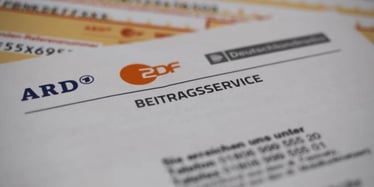German Tax System

Contents
Before you move to Germany, it’s good to be familiar with the taxation system – this will be of utmost importance to those who will be working in the country. In Germany, the main taxes are income tax and social security contributions, as well as solidarity tax, VAT, and church tax.
Below, we answer the most important questions, such as “What is the income tax rate in Germany?”, “How to calculate the taxable amount?”, “What is a tax refund and how to apply for it?” and give more details on the tax types and classes.
Individual income taxes in Germany
Before you start working in Germany, you should get at least some brief knowledge about income tax, the tax classes, and other taxes.
Anyone who resides in Germany and is employed there is subject to individual income tax (Einkommensteuer). The country operates a progressive tax rate which means it increases with taxable income.
How do I pay income tax?
In Germany, income tax is typically deducted directly from your paycheck by your employer through a system known as "Lohnsteuer." This means that your employer withholds the tax from your salary and remits it to the tax authorities on your behalf.
What is the income tax rate in Germany 2024?
The marginal tax rate in Germany refers to the rate at which the last Euro of income is taxed. The tax percentage varies depending on income and the type of tax being considered. For 2024, the tax brackets for income tax are:
- income up to €11,604 per annum = 0% (no tax)
- €11,605 to €66,760 = 14% to 42% (progressive rate)
- €66,761 to €277,825 = 42%
- over €277,826 = 45%
Additionally, there are other mandatory taxes and contributions to consider, such as the solidarity surcharge, church tax, and social security contributions. We will discuss this subject in more detail later in the text.
Online tax calculator
If you want to find out how much you will make after taxes in Germany, using an online calculator can be extremely helpful. These calculators allow you to input your gross salary and other relevant details to estimate your net income after taxes and social security contributions. They take into account various factors, such as tax classes, solidarity surcharge, church tax, and social security contributions, providing a detailed breakdown of deductions and your take-home pay. You need to calculate your monthly (or weekly) wage and then calculate how much will be deducted for income tax and social security contributions based on the bracket you will fall into.
Use an online German income tax calculator to determine how much you should take home after tax and social security contributions.
Tax classes in Germany
There are six tax classes in Germany (called Steuerklassen), and the one you fall into will affect which rate you are taxed at.
- Class I: Single/widowed/civil partnership/divorced. Married persons not in classes II, III, or IV
- Class II: Single but entitled to single-parent allowance
- Class III: Married but spouse does not earn wages/is classified under tax category V/recently deceased
- Class IV: Married (not separated); both earning and residing in Germany
- Class V: Married, but one spouse is classified under tax class III
- Class VI: Individuals on multiple wages from more than one employer
Advantages for married couples
If you are relocating to Germany with a long-term partner, this may be the time to get married; married people in Germany enjoy significant tax allowances.
The annual tax return: Income tax declaration
Filing an annual tax return is necessary to reconcile your tax liability, especially if you have multiple income sources, significant deductions, or are self-employed. The tax year follows the calendar year, and the deadline for submitting the tax return is generally July 31st of the following year. If you use a tax advisor, this deadline can be extended to December 31st.
The tax return process involves declaring all sources of income, applicable deductions, and credits to ensure that you have paid the correct amount of tax throughout the year. When you submit your income tax declaration (Einkommensteuererklärung) to the local tax office, it will reveal whether you have made excess payments and are due a refund.
Those who are employed and taxed at source are not required to do a tax return unless they have changed jobs during the year or earned an additional self-employed income.
Although employed individuals are not required to do a tax return, it might just be in your interest to do one. If you have not been in Germany for a full tax year, for example, you may be entitled to a tax refund. However, this process can be complicated and time-consuming. To avoid those issues and make it easier for you to do your tax declaration, you can check Wundertax. The fintech helps students and expats working in Germany to submit their income tax declarations online.
How to pay less taxes
Under German income tax law, many taxpayer expenses can be deducted from your income. If you want to pay less in taxes, consider the following options.
- Tax refund: Although employed individuals are not required to do a declaration, sometimes it is wise to do one to get an income tax return.
- Claiming deductions: Include deductions for work-related expenses, medical costs, and childcare expenses.
- Home office expenses: If you work from home, you can deduct a portion of your rent, utilities, and office supplies.
Tax advisor
It is highly advisable to use the services of a tax advisor or "Steuerberater" to file your tax return and even just to calculate estimates for what you do or will owe as a freelancer in Germany.
Other German taxes
As well as income tax and social security contributions, there are several other significant taxes in Germany that you should be aware of.
What is church tax in Germany?
Church tax (Kirchensteuer) is a levy paid by registered members of Christian or Jewish congregations in Germany. Similar to income tax and social security contributions, this tax is typically deducted directly from your gross wage. Members are taxed at a rate of 8-9% of their income tax liability, depending on the federal state they reside in. This system ensures that religious institutions receive funding directly from their adherents, which the state collects on behalf of the churches.
What is solidarity tax in Germany?
This tax was introduced in 1991 to rebuild and invest in Eastern Germany after reunification. It remains in place to help finance the ongoing costs of a unified Germany. In 2021, the solidarity surcharge (Solidaritätszuschlag) was abolished for most taxpayers after 30 years. However, those exceeding the annual exemption limit (Freigrenze) must still pay the surcharge.
The exemption limit is set at an annual taxable income of approximately €73,000 for single individuals and about €151,000 for married couples. As a result, only about 10% of the highest-earning citizens are still required to pay it. This change significantly reduces the tax burden for many workers in Germany, particularly for those who are subject to social security contributions and earn less than the exemption limit. So, if you earn more than this amount, you must pay the solidarity surcharge.
What is corporation tax?
Corporation Tax in Germany is a tax levied on the profits of companies operating within the country. The standard rate is 15%, with an additional 5.5% solidarity surcharge on the corporation tax. Companies must also pay a municipal trade tax, which varies between 7% and 17%, depending on the location. This tax system ensures corporations contribute to public finances based on earnings.
How much is VAT in Germany?
Value-added Tax, or VAT (Mehrwertsteuer), is charged on all luxury or non-essential items and services in Germany. The current standard VAT rate is 19%. Some items, such as books and flowers, have a reduced VAT rate of 7%.
Seconded employees in Germany
What should I consider when working as a seconded employee? Many people who move to Germany do so for work because they are seconded, either at their own request or that of their employer. Anyone who is seconded continues to be employed by the same company, which means seconded employees remain on the payroll of their home country and will continue to pay taxes at home.
They, therefore, do not need to pay tax in Germany. Those who are paid by their employer in the country where they pay tax are also not obliged to make social security contributions in Germany. This is true for all EEA countries, but many other countries have bilateral agreements similar to those of Germany. This secondment rule typically applies to secondments of up to two years, although it is possible for this to be the case for up to five years.
Private health insurance
Seconded employees in Germany are advised to take out private health insurance, although EU citizens will be able to access some basic medical care with their EHIC - Electronic Health Insurance Card.
This might also be of interest to you

Driving licence in Germany for foreigners
Have you ever wondered how to get a German driver's license at a certified driving school?

International Student Identity Card (ISIC)
ISIC is an internationally accepted student identity card that allows you to prove your student status worldwide and save a lot of money on various...

International Money Transfer to Germany
You might be wondering what is the best way to transfer a large amount of money to Germany, especially to your Blocked Account with minimized fees...

Radio Tax
Everyone living in Germany must pay the Rundfunkbeitrag if you live in your own flat or in a dormitory unit. ⁉️ Wait, I have to pay a fee even if I...




